Have you ever considered stepping away from the frenetic pace of urban life and immersing yourself in the tranquil simplicity of your ancestral heritage? Does the thought of living minimally, as your ancestors did, appeal to you? Meet a family who’s made this vision their way of life.
At 51, former model and mechanical engineer Rajesh Mate has turned to farming, guiding his family to a life on their ancestral land in Raigad. He now lives on a farm with his wife Smita and two daughters, Dhruvi and Diti, making farming the heart of their daily lives.
When asked why a well-off family from Mumbai’s Dadar would choose Raigad, Rajesh explains, “We wanted to leave behind Mumbai’s high-speed, consumer-oriented existence and reconnect with the simpler, traditional life our ancestors led.”
The shift to Raigad has allowed the Mate family to align their educational and eco-values through permaculture, resulting in a more connected and happy family. Find out why they’re more ready to face challenges now, and how moving from a prestigious Mumbai school to a homeschooling setup in Raigad has led to unexpected benefits for 12-year-old Diti.
‘You can’t defy nature’
The desire to reconnect with his roots took hold of Rajesh in 2017, after attending a five-day Panchagavya course in Nashik. This course, emphasising the use of cow milk, dung, urine, ghee (clarified butter), and curd, highlighted Ayurveda’s holistic healing methods for treating numerous health conditions.
Rajesh’s enthusiasm for Panchagavya products grew after the course, leading him to try making them on his own. He shares that after applying the Panchagavya products, his calf and back pain from driving long distances was relieved. He figured, “If these products worked for me, they could work for others too.”
He also started using a cow ghee-based serum for body aches, fevers, ENT problems, and bruises. He says he applied the serum to his belly button, adhering to the belief that “the belly button is connected to all 72 nerves of the body,” a method inspired by ancestral practices.
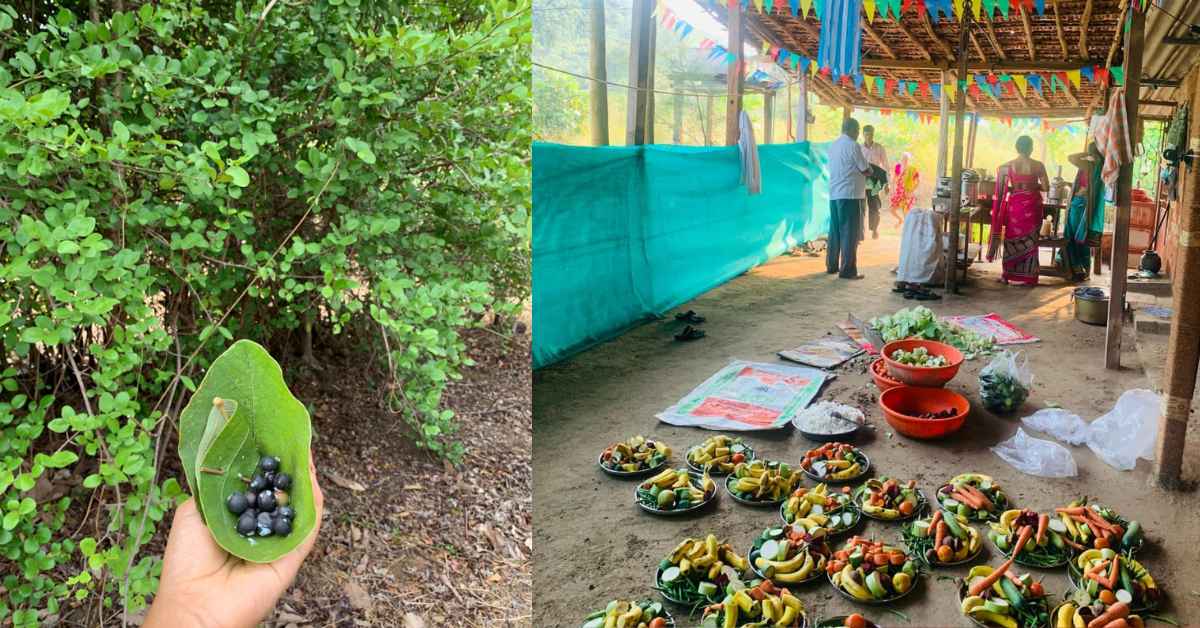
After discovering the numerous benefits of cow-derived products, Rajesh was determined to deepen his knowledge of farming and agriculture, so he took a permaculture design course in Bengaluru.
Later, he thought, “To put my knowledge into practice, I need to move to Raigad.” He started by farming part-time on weekends, commuting from Mumbai to Raigad on Fridays and returning on Sundays. It soon became clear that a complete move to Raigad was the best path forward.
To Rajesh, permaculture is all about efficiently using the resources in your immediate environment. He learned farming basics from his neighbours and discovered that adhering to nature’s principles is vital. “You can’t defy nature,” he says, noting that nature follows its own systems.
He started with traditional fertilisers like cow dung and cow urine, which are rooted in ancient agricultural practices. As he transitioned to permaculture, he started educating others about his methods when they saw his farm thriving without pesticides. “This is how our ancestors farmed,” he explains.
He stresses that soil needs mulching to prevent exposure and evaporation, enabling microorganisms to heal the soil after pesticide damage.
From urban hustle to rural tranquillity
Rajesh shares that his move from Mumbai to Raigad, along with his family, stemmed from a desire to embrace a minimalist lifestyle free from allopathic medicines. But how did Rajesh persuade his family to leave their life in Mumbai and relocate to Raigad? “It wasn’t an easy decision,” he confesses.
His wife, Smita, was quickly on board, but convincing his daughters, Dhruvi and Diti, was challenging. The family agreed to move to Raigad after Dhruvi completed her Class 12 exams at Podar College in Mumbai. Meanwhile, Diti, who was in Class 5, transferred to a school that offered remote learning.
After months of careful consideration, and once everyone was comfortable with the decision, the family finally realised that it was a win-win situation for them all and moved from their Dadar home to their Raigad residence in 2022.
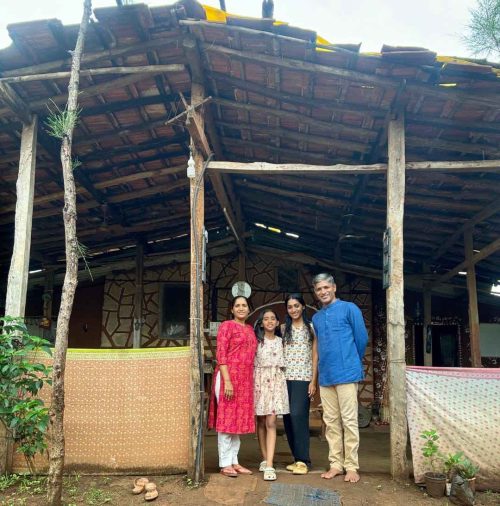
“Relocating to a rural area isn’t without its difficulties. Finding a network was a challenge at first,” Rajesh admits. He mentions that there were times he had to take his family to the Raigad marketplace to find a signal.
During the day, Rajesh oversees his farm and manages his business in central medical gas pipeline systems, which involves supplying breathing gases to ICU units in hospitals. Meanwhile, Smita handles the administrative aspects of the business.
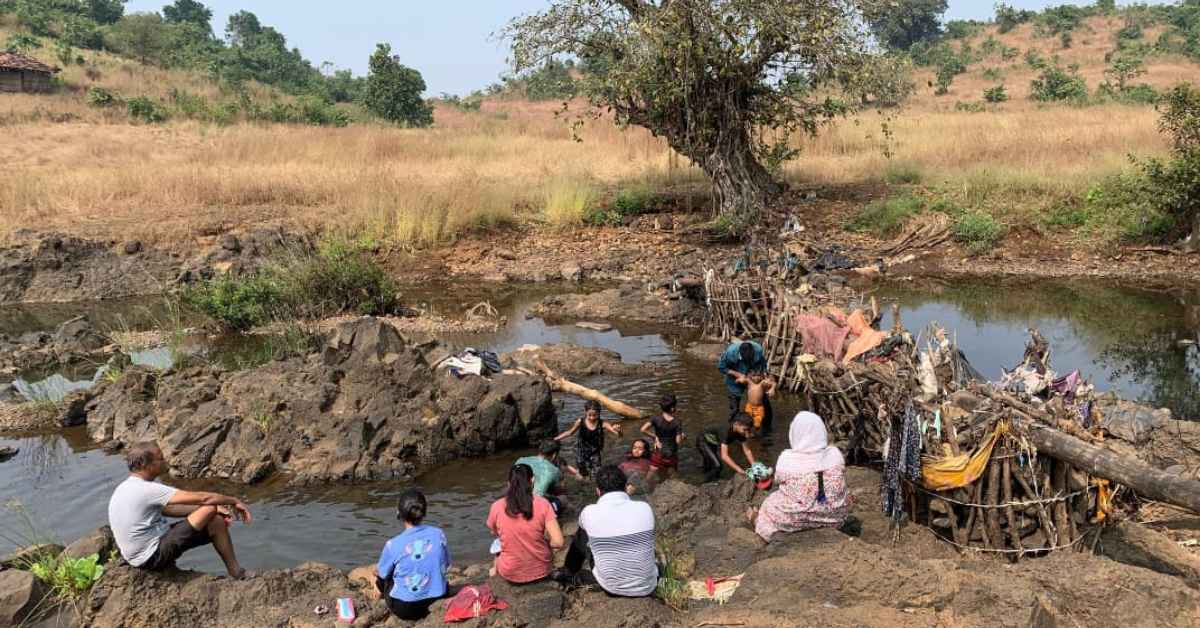
“I own three properties: one in Dadar, one in Kalwa, and one in Thane. At a certain point, I began to question, ‘Why am I buying these flats and investing in gold? If I’m spending money merely for more amenities, when will I ever use them?’” he confesses.
He adds that spending a large amount on short vacations, as many wealthy individuals do, only to return to a city with polluted air and water, doesn’t make sense to him. He argues that true health is dependent on oxygen, which money can’t buy. He describes what is often called “health care” as “sickness care”, believing that true well-being comes from being in tune with nature.
The day begins for the family at 5 am with a meditation session that lasts until 5.30 am. They then perform Agnihotra — a Vedic ritual where they light a copper pot filled with fire, offer ghee and rice to the sun, and chant mantras (sacred phrases). Dhruvi and Diti tend to the birds, dogs, and cats on the farm and help with farming duties. Following the natural cycle, they go to sleep as soon as darkness sets in, around 8 pm.
Nature as classroom
Dhruvi, now 19, has completed courses in leadership in biodiversity conservation and permaculture design, following in her father’s footsteps. Meanwhile, 12-year-old Diti is currently homeschooled. “Most parents prefer conventional schooling for their children,” Rajesh acknowledges. “However, since we are embracing a lifestyle deeply connected with nature, I believe nature should be Diti’s teacher.” He hopes that in Raigad, nature will serve as Diti’s classroom.
“I don’t want my daughter to just collect degrees,” he says, referencing the ancient Gurukul system where students learned a broad spectrum of subjects through hands-on experience. “I presented this concept to my family, and they were on board,” he adds with a smile.
Rajesh proudly shares that Diti can master challenging asanas (exercise postures) and even identify colours and read with a blindfold on. He dubs this practice “Brain Gym”, something that keeps her senses alert and refined.
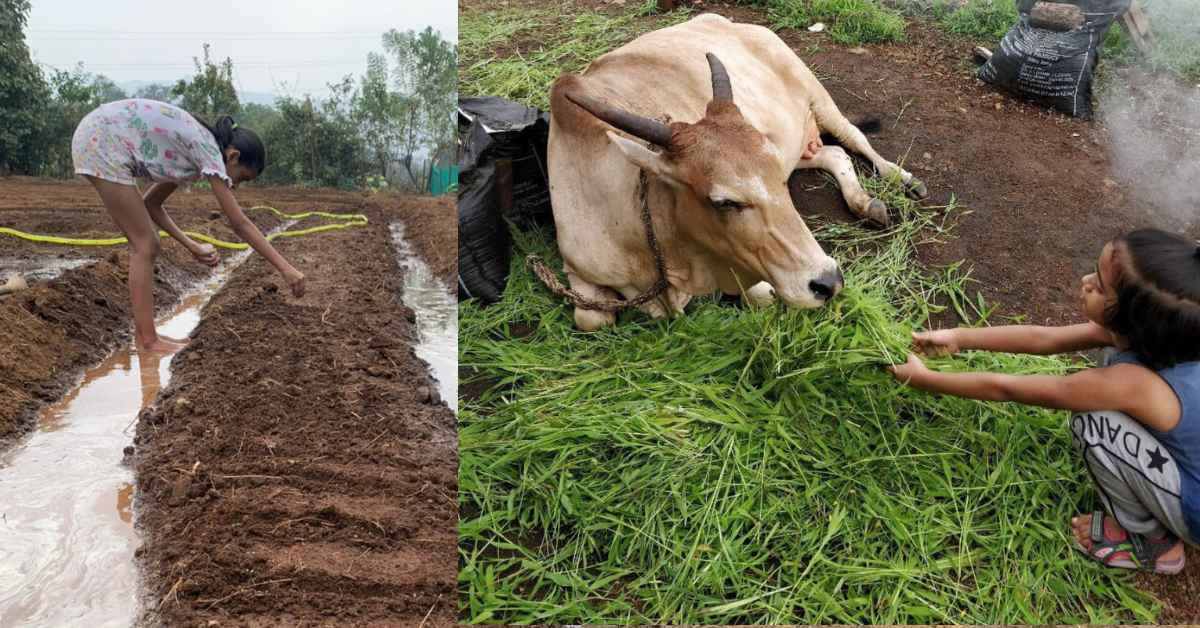
Today, both daughters’ daily activities range from doing fieldwork to making natural mud houses. When asked about how his daughters thrived without traditional schooling, Rajesh explained that adapting to their new lifestyle was easy once they committed to it. He notes that many people around him, who wished to do the same for their children, often inquire about how he managed to persuade his kids to embrace nature as their classroom.
Dhruvi and Diti find themselves happier now, immersed in the company of cows. The family’s initial four cattle have grown to 42. They not only maintain a farm with over 25 wild plants — such as aakur (Acrostichum aureum), spiny gourd, bharangi (Clerodendrum Serratum), air potatoes, elephant foot yam, and Indian round gourd — but also teach sustainability practices in Raigad.
Their brand, Gavya, offers a range of products made from cow dung and various plants, including jewellery, decorative items, hair oils, balms, herbal remedies, and personal care products like eye and nasal drops and toothpowder.
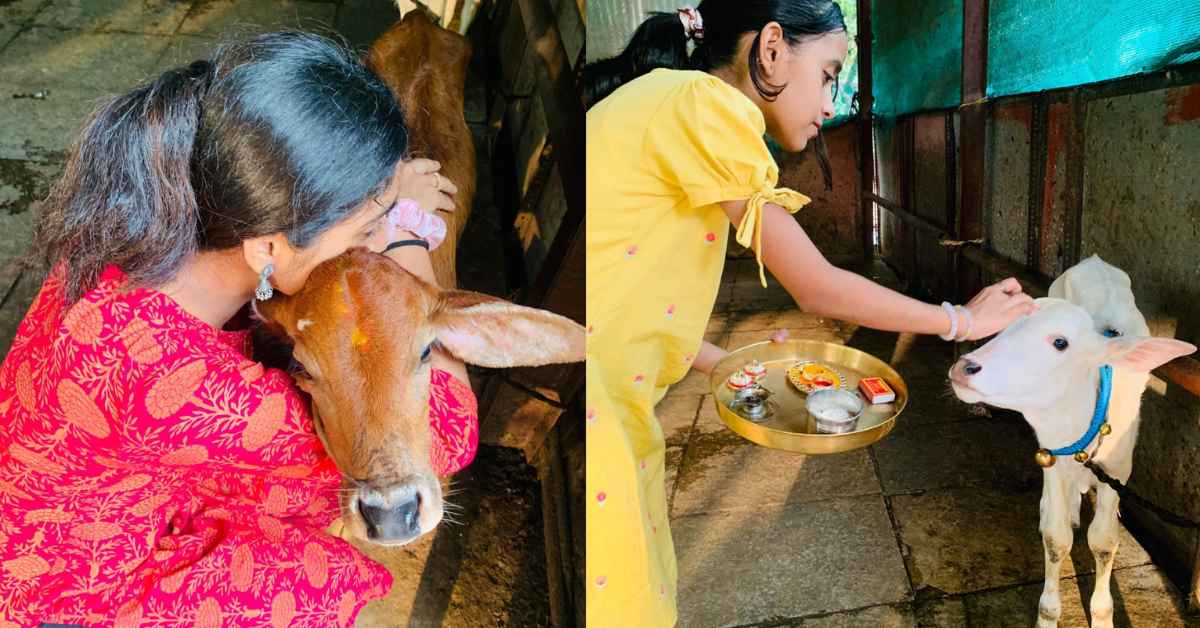
The family’s permaculture approach mirrors nature’s own systems. “We aim for harmony among different natural elements,” Dhruvi says. She points out that areas considered wastelands are often simply misused by humans. Rather than removing a tree that doesn’t fit their farm’s needs, she adapts the surrounding land to fit it. “Permaculture offers organic solutions for utilising these ‘wasted’ lands.”
Their farm includes biodynamic domes for poultry, agronets, and fishing nets for regulating temperature and protecting crops. “Our system allows hen compost to turn into fertiliser, creating a self-sustaining ecosystem,” he adds.
Dhruvi stresses that permaculture’s ethics — earth care, people care, and fair share — apply not only to land use but also to everyday practices.
Designed to follow the sun’s arc, the farm makes optimal use of sunlight. The land’s slopes allow for effective rainwater harvesting through trenches.
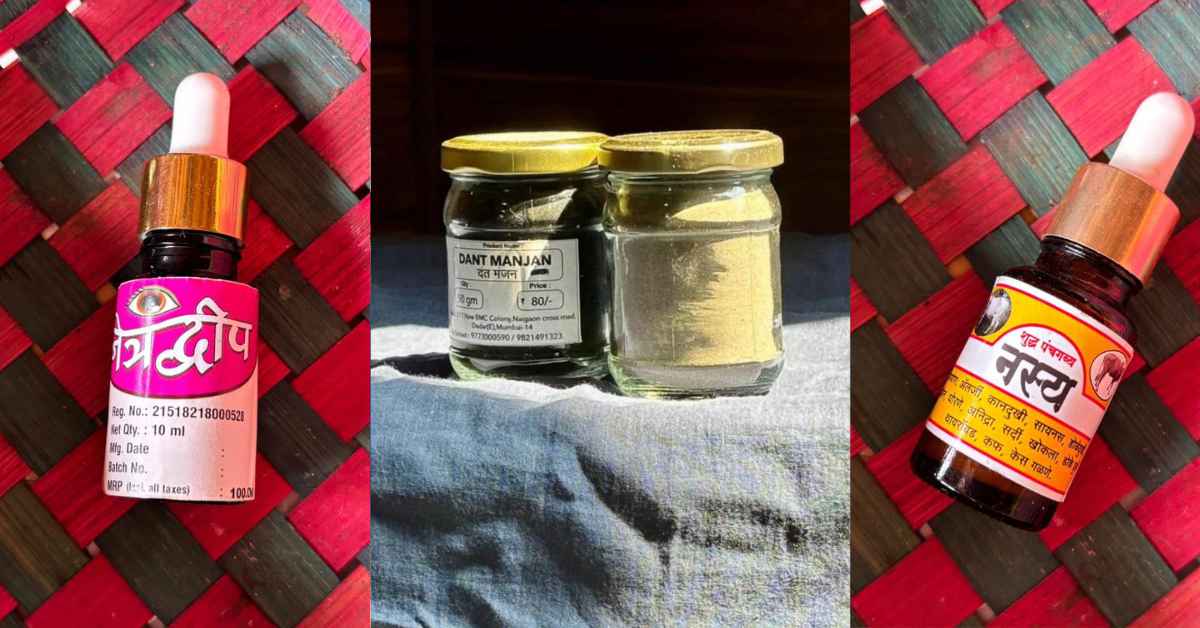
What is the key ritual that brings the family together? Rajesh says: Family time! Before turning in each night, the family comes together to recount their day. “Diti always has a lot to share,” Rajesh admits. “Papa, the cow is pregnant. Papa, I played with the cats.”
According to Dhruvi, her family is more united now, and they can develop flexible solutions for their farm as well as their personal lives. “Moving back to your native place isn’t feasible for everyone,” she admits. Yet, people can still make an impact through small actions, such as taking public transport more often or cutting down on fast fashion. “In Mumbai, we made a point of using everything we brought home multiple times, including plastic bags,” Dhruvi recalls. She credits her family’s support as the key factor in easing their transition.
In her view, patience is crucial for sustaining earth-work. “Every day on the farm brings unexpected challenges,” she reveals. This reality has led the family to remain dedicated to finding solutions for issues such as treating injured animals or fixing their vegetable garden’s water system. “Dealing with these daily challenges has embedded patience into our daily lives,” Dhruvi acknowledges.
Is the family feeling isolated away from their Mumbai circle? “Absolutely not!” Rajesh assures. He explains that they stay well-connected with their friends and family. “We frequently have guests coming to see how we live sustainably, including those who want to replicate our lifestyle but have their own hurdles. We gladly show them around.”
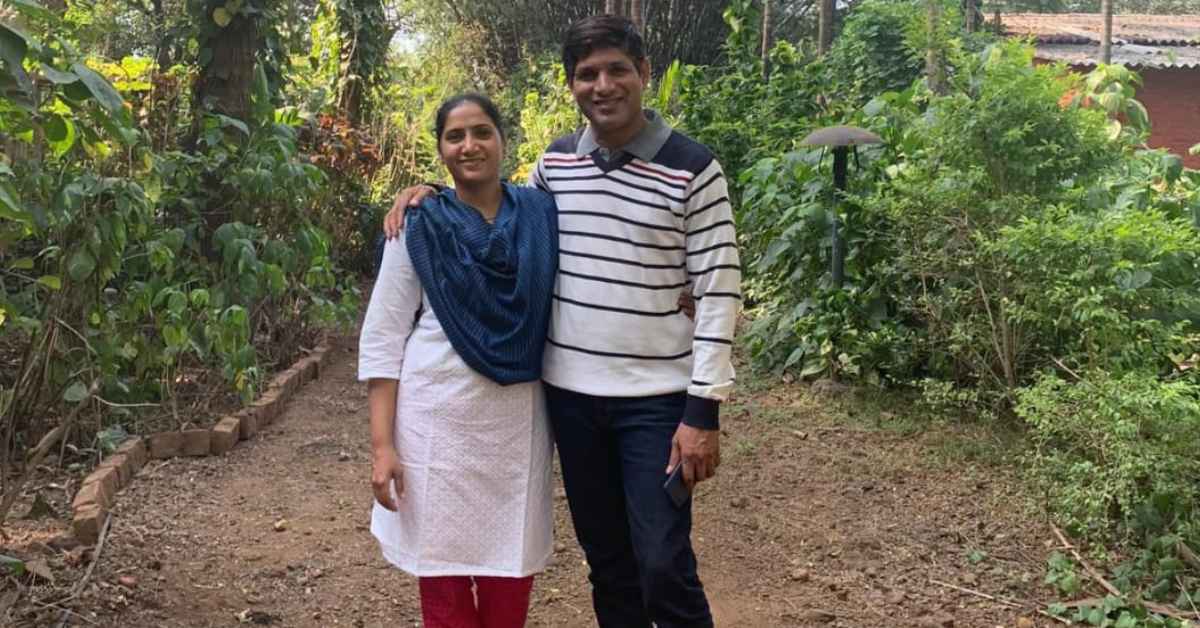
“We don’t know what the future holds for us, all we know is that we’ll go with nature,” he remarks.
Edited by Pranita Bhat; All images courtesy Dhruvi Mate
No comments:
Post a Comment